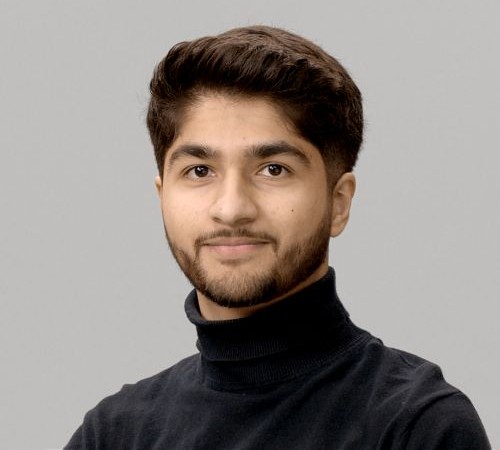A love of wearable tech
Shafae has always loved making things. As a child he built his own workshop at home, sourcing second hand tools and equipment. But it was aged 12, after watching the science fiction film Total Recall, that his love of wearable technology began. Shafae was inspired by the idea of having a communication device implanted into the palm of one’s hand. “I took a Bluetooth headset and rewired it into a glove so there was a speaker in the thumb and a microphone in the pinkie finger, allowing users to take phone calls without touching their phone,” he says. “You could then tap your fingertips with your thumb to control programmable actions on your phone. I think this is where my love for wearable tech really started."
Shafae studied design engineering at Imperial College London and says he felt ‘guilty’ at first for not choosing a more conventional engineering degree. “I always thought I needed to do traditional engineering, but I believe you should go to where your passion draws you."

A gap in the market
While at university, Shafae could see that wearable technology wasn’t being taken advantage of in the UK, particularly in areas like healthcare and sport. “I really wanted to advance wearable tech and get to a place where technology truly serves us, rather than us serve it. That was the basis of my ELS application."
Shafae made the most of his ELS funding, spending it on a website portfolio, travel and accommodation during internships, and to travel to schools to host 3D printing workshops. He credits the ELS for changing his outlook on spending money on personal development. “Growing up, I was taught to be frugal. But the ELS gave me a capital boost that allowed me to change my outlook. It taught me to invest in myself, and my career, and I still apply that mindset today,” he says.
Internship at Dyson
Shafae’s internships included three months at Dyson, where he got to work on the Dyson Zone – a wearable device that combines noise-cancelling headphones with an air purification system. “I got to directly develop the filter presence detection mechanism, iterating the design with engineering analysis. It taught me a lot,” he says.
He also spent six months as a junior design engineer at Rheon Labs, working on the design of helmet inserts and athletic garments that integrate a non-Newtonian polymer, helping to absorb impact but remaining flexible and lightweight.
Shafae’s ELS funding also allowed him to attend the 2020 Dubai World Expo where he networked with people across sustainability and medicine. His attendance there coincided with two of his university projects being featured in the Dubai Global Grad Show. The projects were a personal skin scanner that allows early remote diagnosis of skin diseases, and sustainable 3D printed shoes with self-healing capabilities. The second of these projects alsowon a Global Footwear Award. “Being in Dubai was an incredibly valuable experience. I made so many connections,” he says.
A step into entrepreneurship
While still at university, Shafae led one of the first projects at the student design consultancy, Dreamteam Design. “It was during the pandemic, and we were just starting to return to campus,” he explains. “We wanted to build a sense of community in a time of uncertainty, so we created branded Imperial facemasks – our goal was to make students feel safe and unified. We presented the project to an executive panel at Imperial and received funding. It was my first successful entrepreneurial venture.”
After graduating, Shafae joined Samsung Research America on an internship as a mechanical design engineer, before being promoted to senior mechanical design engineer. Based in Silicon Valley, California, his ELS funding helped with his travel and accommodation expenses.
Ohsnap and SHAPE SHOES
Then in 2024, Shafae joined Ohsnap – a US-based smartphone accessory brand. He is the engineering lead for a new product called MCON, a wireless gaming controller that magnetically connects to the back of your phone. “MCON is small and can fit in your pocket, so you can game on the go. I’ve always enjoyed gaming, so it is a really fun product to work on and presents a lot of interesting engineering challenges given the new form factor.” MCON has raised $1.7million on Kickstarter so far and has already won a Red Dot Design award. The company hopes to bring the product to market in 2025.
Shafae is also the co-founder of SHAPE SHOES, a footwear company that uses 3D printing and computational design to produce shoes for artists and creatives, aiming to tell their stories through design. “I have always had a passion for innovation, and my focus is on the interaction between the digital and physical world, creating products with both function and meaning,” he says.
Interested in participating in the Engineering Leaders Scholarship?
Visit the programme pages to find out more about how it could benefit you and your career.
